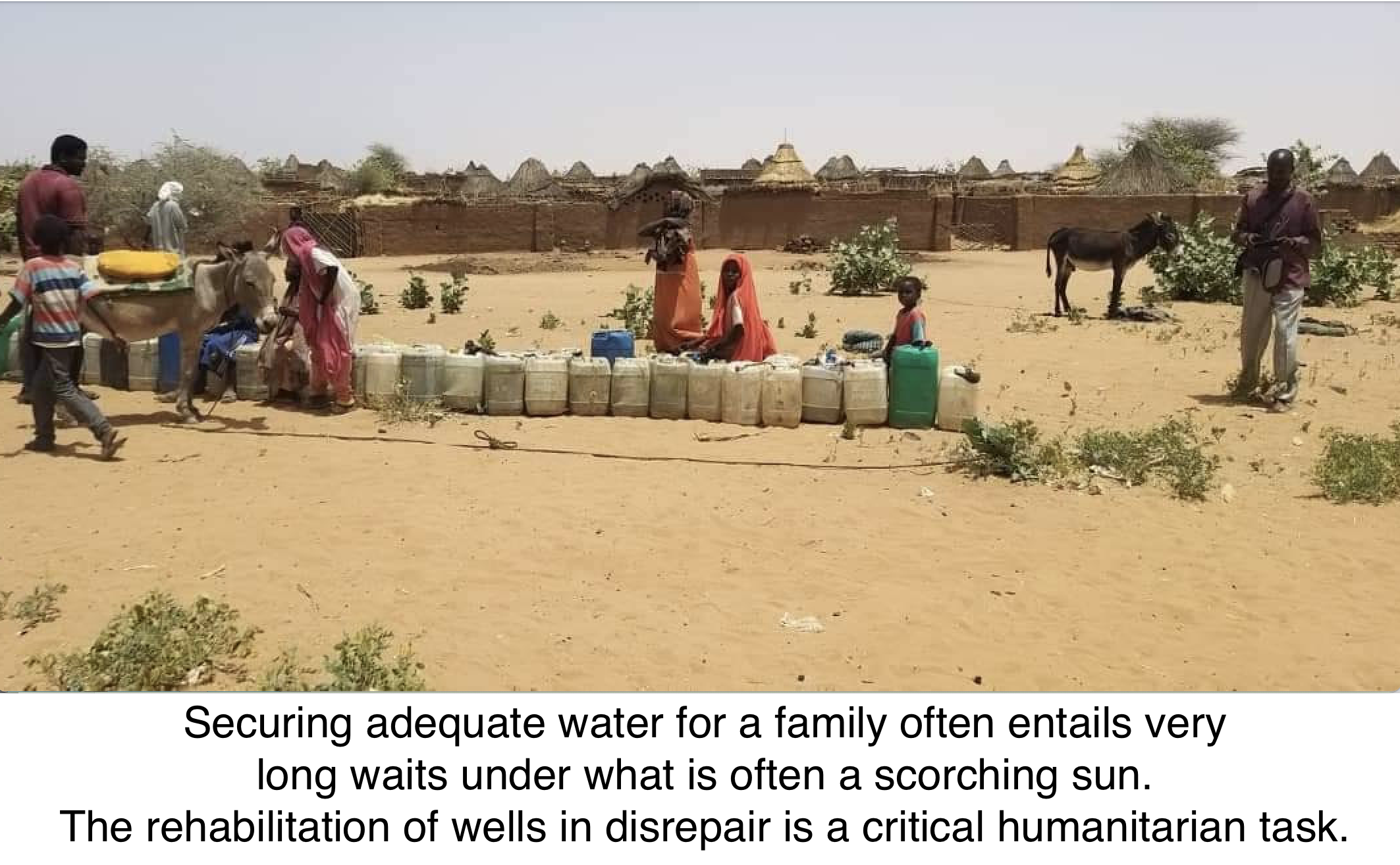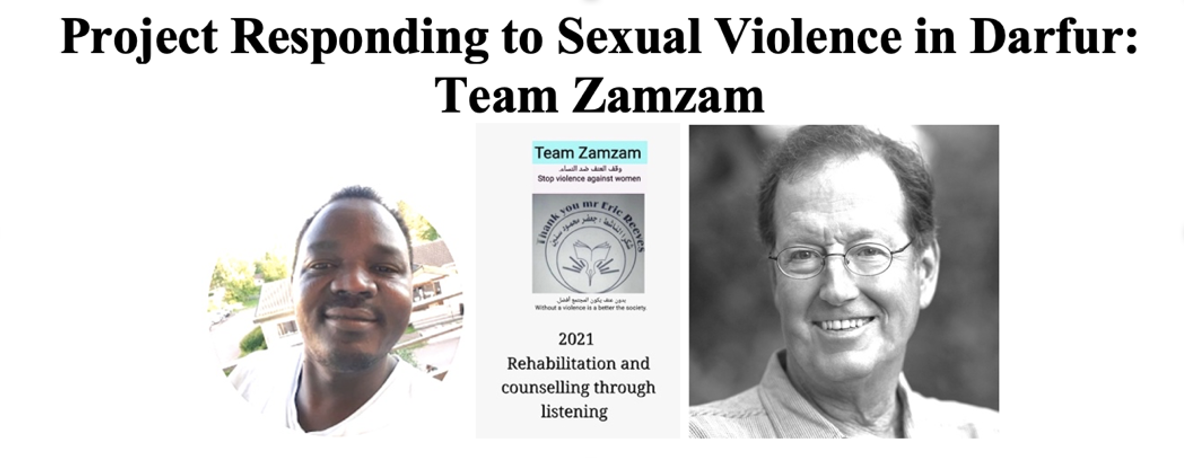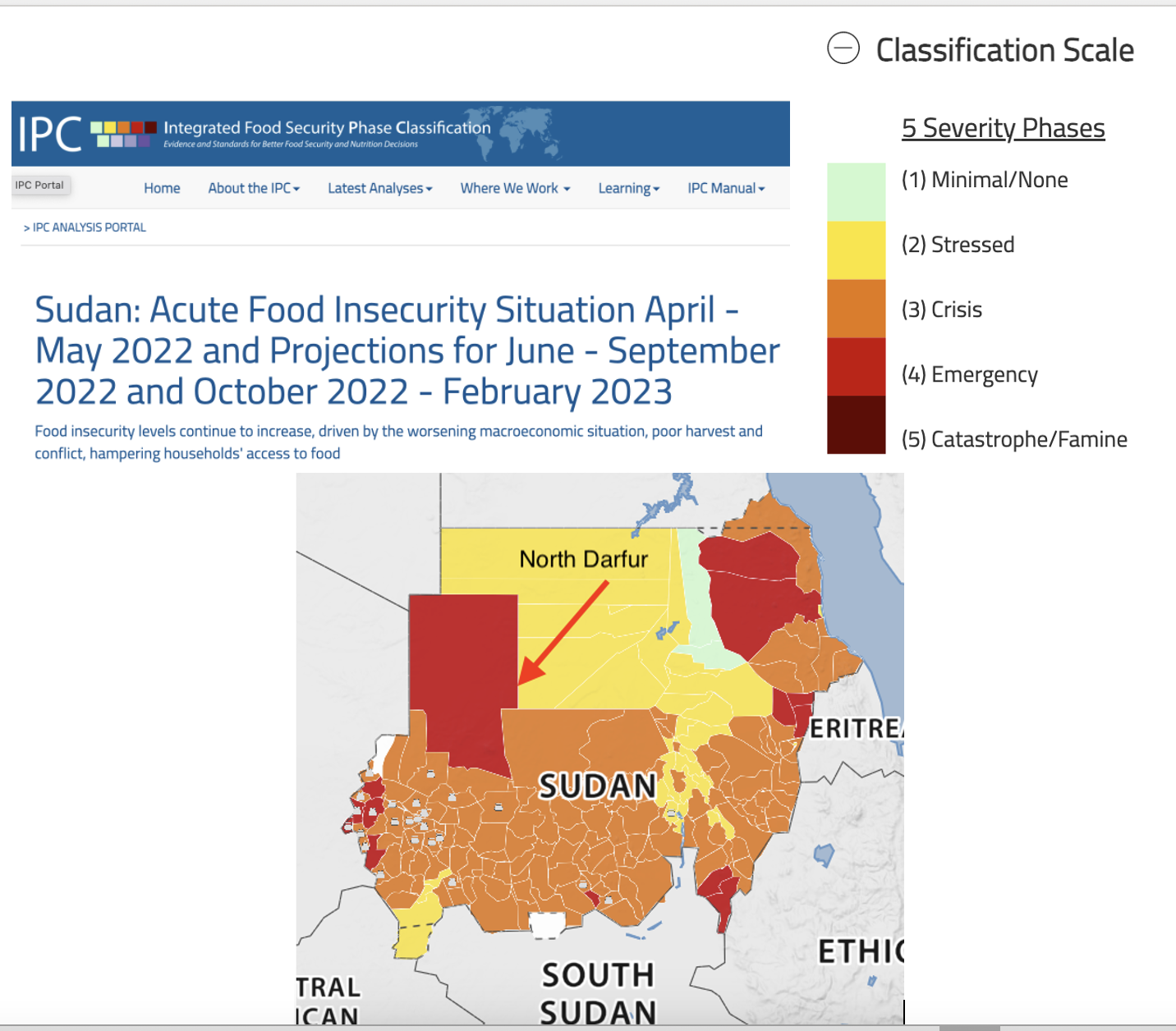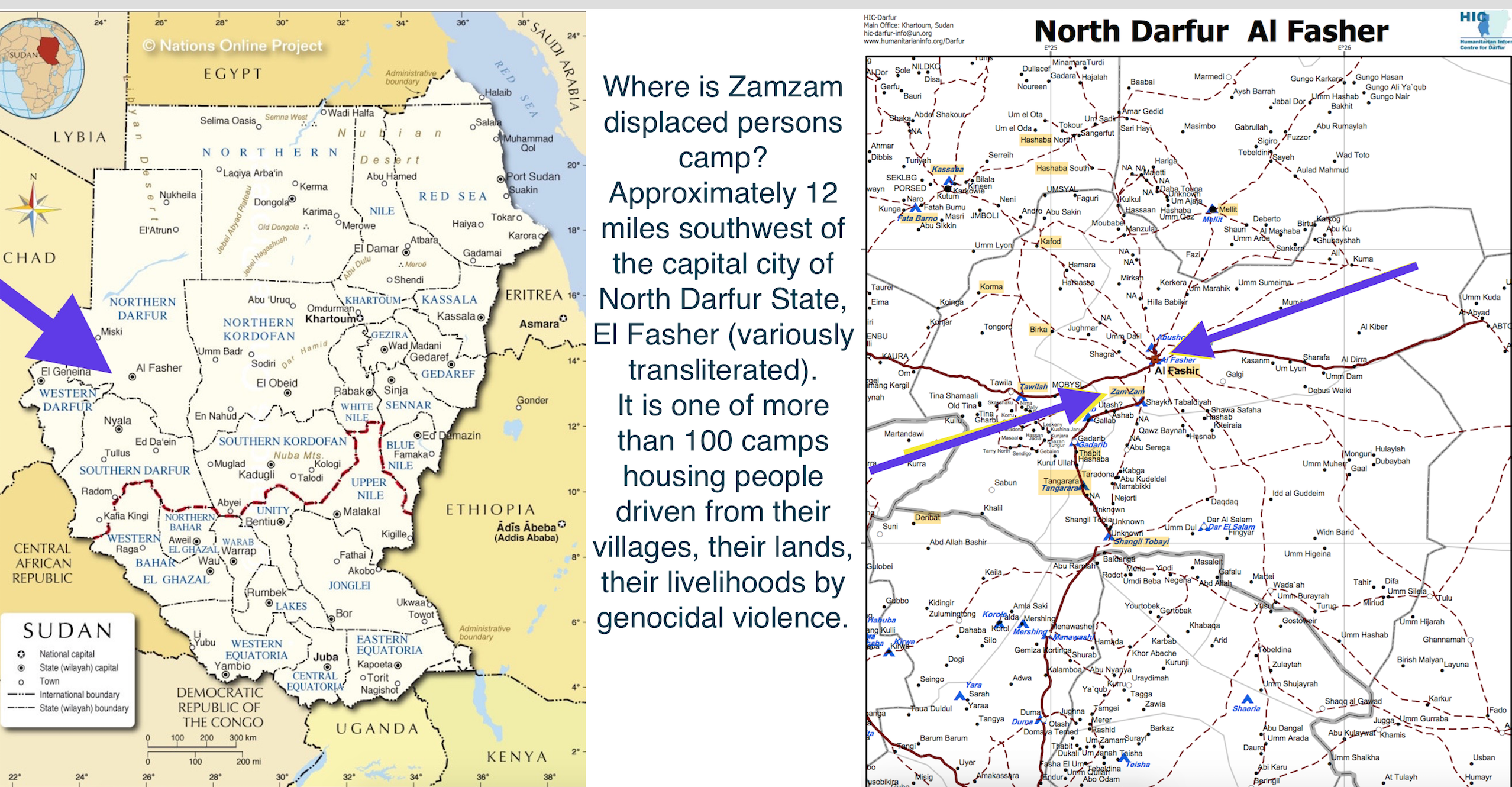Gaffar Mohammud Saeneen and Eric Reeves, Co-Chairs
Nancy Reeves, Editor and Funding Advisor; Julie Darcq, Online Campaign Coordinator
Overview (Eric)
November has been an active month for Team Zamzam, especially given the increasingly threatening food insecurity in Darfur, and North Darfur in particular. But I would like to begin with two highlights.
The first is that donor generosity has made possible the rehabilitation of a second water well in Zamzam camp (the first such effort occurred this past May). The challenges of securing enough water for drinking and cooking are immense, and women and children often wait hours under a scorching sun to obtain a minimal but critical amount of water. More than 90% of the wells in this camp of some 400,000 human beings are either non-functional or produce only brackish water. The rehabilitation of the well in one neighborhood in May was greeted with tremendous joy and gratitude—and similar joy will certainly greet the availability of water from this new well, which will be available sometime in the next week or two (a Darfuri hydrologist and his team are working now on what is inevitably a difficult challenge).

The second highlight reflects the skill and dedication of the women in Zamzam in providing psychosocial counseling to women traumatized by sexual violence. Depression, fear, shame, and other forms of post-traumatic stress disorder (PTSD) are very often extreme and overwhelm the lives of girls and young women. While Team Zamzam has overseen more than 50 fistula surgeries to relieve the excruciating physical pain that too often comes with sexual violence, the greater challenge is in providing the desperately needed psychological help in regaining a life that feels worth living. There have been few more compelling examples provided by the coordinating counselor for Team Zamzam than the following (all translation by Gaffar):
The story of Khadija Suleiman Ibrahim, 23 years old, from the Zamzam camp.
Khadija, after spending about three years in a severe depression caused by gang rape, got married last year and gave birth to a beautiful daughter, whom she named Amani which means “the wishes.” She is one of the first to receive moral and psychological support from the program of private talk sessions with Zamzam team’s counselors.
Since the end of 2020, our constant contact with her hasn’t stopped but rather, after recovering from depression, she has volunteered continuously to encourage attendees who are suffering from the same problem. After giving birth to her first child in October this year 2022, Khadija and her husband Mubarak have invited the counselors of team Zamzam for dinner at their house to share their happiness and pay their gratitude for the help they received.
Khadija said,
“Life in 2020 was almost over for me had I not found you, my Sisters. I tried many ways to end my life, but each time I failed and felt even more shame, which was killing me slowly.
“I didn’t realise that God wanted to spare me until I met you. Looking back to those horrible days, today I feel neither ashamed nor remorseful but rather regret at how deep I had fallen because of thugs within the Janjaweed militias. Before meeting you Sisters, I wasn’t only suffering from depression and daily stress, but I was suffering from the desire for vengeance on those who humiliated me.
“Then I couldn’t stop thinking about them, and the more I thought about them, the more nightmares and flashbacks haunted me through the night. My life had continued like this in nightmares and stress for three years until that day when you Fatima, Manheil, and other women from the volunteers who came to see me. Their powerful words of that day had turned things around for me and it stayed with me until this day. Their words had not only helped me to get on my feet but I memorised by heart to use it to help others who are in difficult situations.
“Immediately after recovering from my depression, I began to think constantly about my childhood lover, Mubarak, who I thought would have abandoned me. This worried me so much, but thanks be to Allah he didn’t. You know, in Darfur one wouldn’t find many reasonably understandable men like him and today I feel luckiest wife around here. Mubarak and I both came from the same village, we grew up in the same neighbourhood, and he perfectly understands what we girls are going through.
“I must admit that the name of my daughter has popped up in my mind after about four sessions. Because then all I was thinking was my lover and I never stopped wishing to have children with him—and thank God my prayers were answered. That’s why I named her Amani and I still continue to wish for a few more children to make us happier.
“For those thugs in the Janjaweed militias who humiliated me and my friends while we were on the way back from Kolgai, I don’t have the same desire for vengeance on them now. This doesn’t mean that I have forgiven them; no, I have neither forgiven them nor forgotten what happened to us that day and what is still happening every day.
“But I feel pity for their ignorance; I’m still disgusted by their idiocy and their imbecility. I feel pity for their mothers and their sisters too. For the Janjaweed militias and the Arab nomads in general, degrading women is in their blood and in their culture and we can only change their behaviour by being strong and fighting back. What is good, though, is that many girls are now coming out to talk about what happened to them, even though no one in this country dares to press charges against Arab militias.
“But victims talking to each other through the Sisters’ Team Zamzam programme, and it is really helpful in many ways. Talking to each other through sisters who perfectly understand us is so very helpful. It helps to release all negative energies, anxiety and anger that is boiling inside the victims. Since I recovered, I haven’t stopped coming to help the Sisters who helped to get myself back until the latest stage of my pregnancy. And I won’t stop coming to participate until at least all of my friends are fully recovered.
“I feel I’m the luckiest wife and happiest new mum around. You Sisters and my husband helped me so much to defeat that devilish spirit which hunted me for three years simply by talking. But there are still many young girls out there suffering in silence from the pain of fistula and the nightmares of humiliation. I hope they all get through these difficult times, and I wish them speedy recovery. All this because of you and I’m grateful forever. I love you my Sisters of Team Zamzam.”
The skill, patience, and experience necessary to effect this kind of psychological recovery can hardly be overstated. It is the counselors’ linguistic and cultural fluency, as well as their keen local knowledge, makes even a start to recovery possible.
To date, as we move further into the third year of our project, more than three thousand girls and women have received psychosocial counseling, either in group or individual settings, from Team Zamzam.
The coordinating counselor for the Team has provided an overview of work done this past month as well as a description of the continuing insecurity, political machinations in North Darfur, and broader health issues (her full report may be found in the extensive ANNEX to this update).
An account of the work has been done from late October to November 23, 2022 by Team Zamzam includes:
[1] Two separate visits were made to several villages surrounding the area of Tabit, Shangil Tobay, and Abu Zariqa to check on people’s conditions and evaluate the present security situation in the area.
[2] Four different meetings were held with the camp’s security committee to hear their concerns.
[3] Various meetings were held in a number of neighbourhoods in Zamzam with the camp’s women’s groups to follow up on recommendations from previous meetings.
[i] Two meetings have been held with the volunteer groups to discuss issues concerning the camp and share points of views.
[ii] Several visits and tours of primary schools in the camp and the secondary schools in the surrounding area to assess health conditions of pupils and raise awareness concerning potential outbreaks of fever.
[iii] A total of eight visits to different hospitals accompanying patients and sick people with various illnesses for treatment.
Distribution of basic necessities:
As for basic necessities, food remains the most preferred commodity, as the majority of IDPS in Zamzam are struggling with great difficulty to meet daily needs. The severe shortage of food and lack of income to buy food is becoming an ever-greater burden, forcing families to resort to begging on the streets. For the vulnerable families who previously depended on humanitarian aid, today life has become extremely difficult for them: their aid portion [mainly from the UN World Food Program–ER] has been decreased to less than 25% of what they previously received.
This scarcity of food has been triggered by the deliberate, violent destruction of agricultural production over the past two seasons, resulting has been outrageous increases in prices and thus the inability of impoverished families to buy what they need. This has created an atmosphere of despair and increased the spread of malnutrition and disease among children.
During the past month, 162 families benefited from food distribution.
Feminine Hygiene kits
Total beneficiaries: 12 girls and women
Counseling program
Individual counseling: 81 sessions
Group counseling: 35 sessions
*****************
The severity of the food crisis cannot be overstated. The word “famine” continues to be used with increased frequency as food insecurity has declined rapidly. Already at “Phase 4” (Crisis), food availability in Darfur continues to show signs of even further decline, given what the coordinating counselor reports about the current agricultural season, particularly the absence of farming because of Arab militia violence. The report of the Integrated Food Security Phase Classification for Sudan from last May was highly alarming indeed, but has been overtaken by events; there is now clear evidence of starvation and such severe malnutrition as to contribute to significant mortality.
Help is desperately needed.
How to Help
Any assistance will be greatly appreciated by Team Zamzam, and by the girls and women whose suffering they seek to alleviate, and who distribute all they can to those within the camp who daily move closer to starvation. I should stress the tremendous efficiencies of purchases by a staff with local knowledge, and the value of their deep understanding of where need is greatest within this vast camp, swollen to roughly 400,000 people with recent displacements caused by insecurity.
It is now possible to make a tax-deductible contribution to our project, using a portal on the website of a 501/c/3 organization operating in Sudan. Operation Broken Silence, working primarily on health and education issues in the Nuba Mountains of South Kordofan, has created a special site for a tax-deductible contributions to our project, and we hope this makes contributing to the health and well-being of girls and women in Zamzam more attractive.
We also hope that all will keep in mind that our project as a whole operates with truly extraordinary efficiency, in ways matched by no humanitarian organization operating in Darfur that I am aware of, a region I have been researching for two decades.
There is absolutely no overhead for this project.
Those wishing to assist in funding the work of Team Zamzam may give in one of three ways:
• Directly, as a tax-deductible contribution through Operation Broken Silence:
https://fundraise.operationbrokensilence.org/give/434150/#!/donation/checkout
• By sending a check directly to Eric (Eric Reeves, 31 Franklin St., Northampton, MA 01060)
• Or through the purchase of one of Eric’s woodturnings:
https://www.ericreeves-woodturner.com/gallery
100% of the purchase price of every woodturning directly supports
the project in Zamzam.
*******************
• Previous updates are archived at: https://www.ericreeves-woodturner.com/blog/
• A compendium of testimonials from girls and women who have been helped by the counselors of Team Zamzam may be found here.
• A “You Tube” video of Eric describing the project can be found at: https://youtu.be/QsRUa7GoVgY
Where is Zamzam IDP camp?
Eric Reeves, Fellow, Rift Valley Institute
Trustee, Darfur Bar Association






